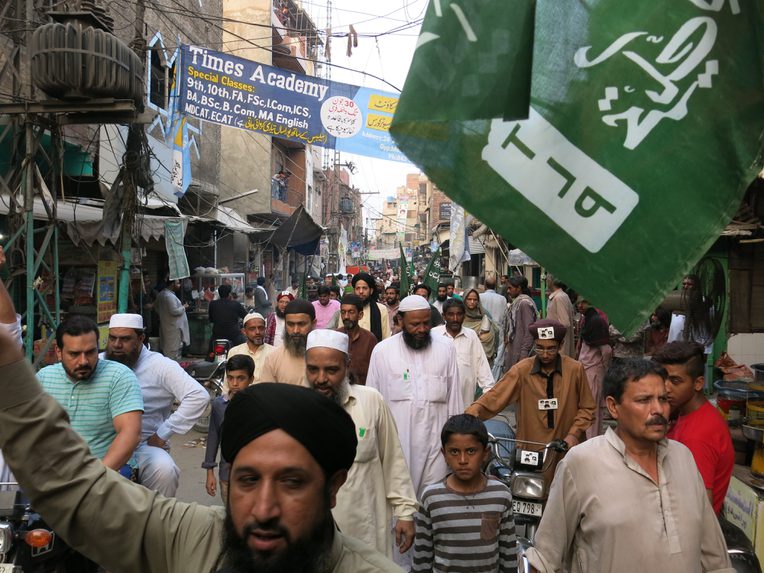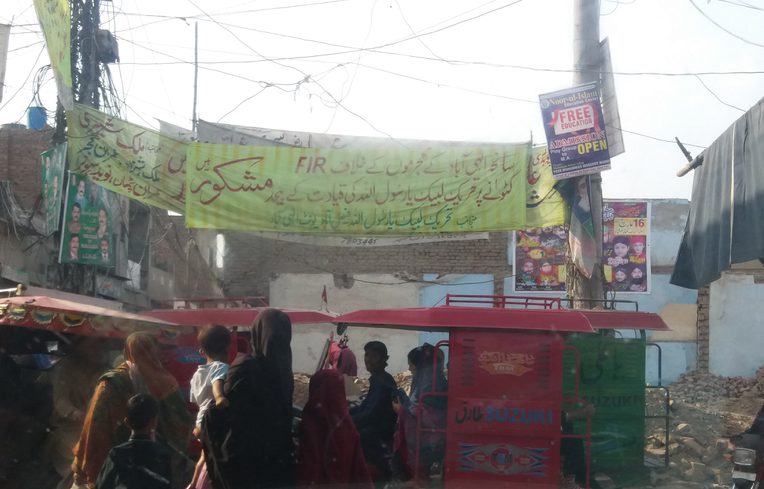The Sovereign Power of the Mob: Blasphemy Accusations as Democratic Politics in Pakistan
From the Series: Majoritarian Politics in South Asia
From the Series: Majoritarian Politics in South Asia

Situated off the busy Main Satiana Road in Faisalabad, a narrow street leads to a dizzying maze of alleyways that traverse the working-class area of Illahi Abad. The neighborhood is adjacent to Warispura, one of the most densely populated Christian-majority localities in the Punjab, and straddles two important electoral constituencies of Faisalabad. The Khushkhabri Church building marks the entrance to the neighborhood. In front of it is a large banner that reads: “Protection of religious minorities is their constitutional right and our duty. But if anyone dares to blaspheme against our Holy Prophet, we will make an example out of them.” How do we reconcile this recognition of the constitutional rights of Christians with the threat of violence in blasphemy accusations? What, precisely, does the threat of violence do in the creation of national subjects? We argue that blasphemy accusations and the mob violence that ensues from them serve not only an exclusionary function but also an incorporative one, transforming Christians into subordinates and dependents in the religio-caste hierarchy at the heart of the Pakistani national imaginary.
In February 2018, a few months before general elections in Pakistan, residents of Illahi Abad packed their belongings and left their homes amid threats of a mob attack over blasphemy allegations. Demonstrations alleging blasphemy were led by local representatives of the Tehreek-i-Labaik Pakistan (TLP), a political party that emerged out of a Barelvi-led protest movement for the release of Mumtaz Qadri, the guard who assassinated Punjab governor Salmaan Taseer. Taseer had publicly defended Asia Masih, a poor Christian woman and mother of five who had been convicted and sentenced to death under Pakistan’s notorious blasphemy laws. The blasphemy laws prescribe harsh punishments and even death for anyone who defiles the sacred personage of the Prophet and the Quran. Further investigation into Masih’s case revealed that she had enraged the caste sensibilities of some of her fellow villagers by drinking water from a common tube well, thus contaminating the water.1

Most of the Christian families in Illahi Abad moved there from villages in the Punjab in the 1980s to work in the burgeoning textile industry on Satiana Road. The Christians in Illahi Abad, who now live in three or four streets, are numerically outnumbered by their Muslim neighbors, but the presence and political significance of Warispura and surrounding Christian majority colonies has always provided Illahi Abad a shadow of security.
The banner in front of the Khushkhabri Church appeared a day after four Christian men and two Muslim men were accused of committing blasphemy by supporters of the TLP. On February 23, a few members of the TLP were painting over a Merry Christmas wall-chalking with TLP slogans when some local Christian men got into a fist fight with them. Later, the Christian men along with two of their Muslim friends with whom they ran a bootlegging business attacked a shop owned by one of the members of the TLP.
Munawar Shehzad, the complainant in the police report, told Sarah, “Then they [the Christian boys and their Muslim neighbors] brought guns with them and started shooting at us.” Shehzad’s brother Muhammad Azhar received bullet injuries in the attack. But when the police were called, the TLP supporters demanded that a blasphemy case be registered against the Christian and Muslim men who had shot at them.

Overnight, prayer leaders of six mosques from the area used loudspeakers to call their supporters to protest, and by 10:00 a.m. on Saturday morning more than two thousand TLP workers and supporters had gathered on Main Satiana Road in front of Illahi Abad. They did not disperse until the police filed a blasphemy case. The leader of the mob, Muhammad Shahbaz, was later granted a political ticket to contest the election by the TLP. “We want the Christian families that have left to return to their homes and the TLP is prepared to offer them protection. We just want to make it clear that no one can get away with blaspheming against our prophet. If it wasn’t for TLP, Illahi Abad would have been a Gojra or Shanti Nagar by now,” said Shahbaz. (Gojra was burned down in 2009 over a blasphemy charge and Shanti Nagar in 1998.)
The banner in front of the Khushkhabri Church confirms Giorgio Agamben’s (1998) well-known argument that the essence of sovereignty is the power to define who will live and who will die; but Christians in the above account are never reduced to bare life or those who can be killed with impunity. Instead, Christians retain their status as constitutional subjects deserving of protection, but the protection is conditional upon them accepting their subordinate status. In Illahi Abad, Christian self-assertion was made possible by the unusual numerical majority in the area. A few Christian men decided to assert the autonomy of this space as a Christian or non-Islamic space. The TLP responded by raising an ontological question about the worthiness of the life of the Christian inhabitants of Illahi Abad. Are they blasphemers? Can they be killed? The mob beckoned by these questions forced the Christians of Illahi Abad to flee their homes but they could return if they accepted that it is the TLP that decides who deserves security. To demonstrate this acceptance, leaders of the Christian community publicly disavowed the young Christian men who had fought with the TLP as “goons” and stated that they brought ignominy to the community by selling alcohol. A blasphemy accusation, then, turned the TLP into a sovereign and transformed the Christians of Illahi Abad into their political dependents.
As assertions of sovereign power, blasphemy accusations function to create fear and insecurity in order to define the conditions under which the accused should be granted security. The aim of violence, then, is not only the purification of the national self of unwanted or “impure” elements, as has been stressed in many accounts of xenophobic violence (Appadurai 1999), but also the reproduction of sociopolitical hierarchies. The pure and the impure can live side-by-side as long as the latter accept their subordinate status. Blasphemy accusations and the fear of mob violence in Pakistan transform religious minorities into dependents and thus reproduce the religio-caste hierarchies at the heart of the national imaginary.
Democratization in Pakistan has opened new possibilities for challenging religio-caste hierarchies by those defined as subordinate, as evidenced in the self-assertion of the Christian men, but aspiring sovereigns like the TLP know that they can harness the power of the mob to transform those very people into political dependents and even, potentially, into their own electoral constituency. As the TLP banner states, protection is “their constitutional right” and granting security is “our duty.” The aim of blasphemy accusations is to frame the constitutional rights of religious minorities, particularly the right to security, as a gift of Islamic largesse. It is the power of the mob that ensures that this gift must be accepted.
1. Christians in Pakistan are widely understood as low-caste converts from Hinduism and are often treated as impure and even “untouchable.” Poor Christians are channeled into work related to waste management, which in turn reinforces their “untouchable” status. See https://www.worldwatchmonitor.org/2018/11/untouchable-caste-identity-haunts-pakistani-christians-like-asia-bibi/.
Agamben, Giorgio. 1998. Homo Sacer: Sovereign Power and Bare Life. Stanford, Calif.: Stanford University Press.
Appadurai, Arjun. 1999. “Dead Certainty: Ethnic Violence in the Era of Globalization.” Public Culture 10, no. 2: 225–47.